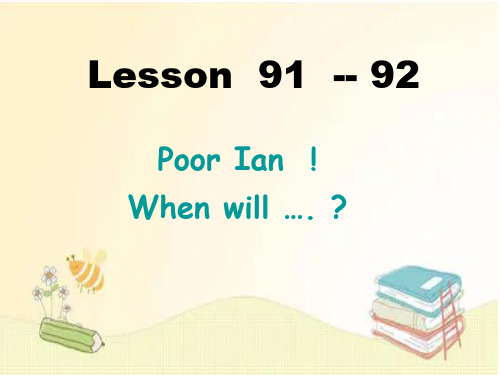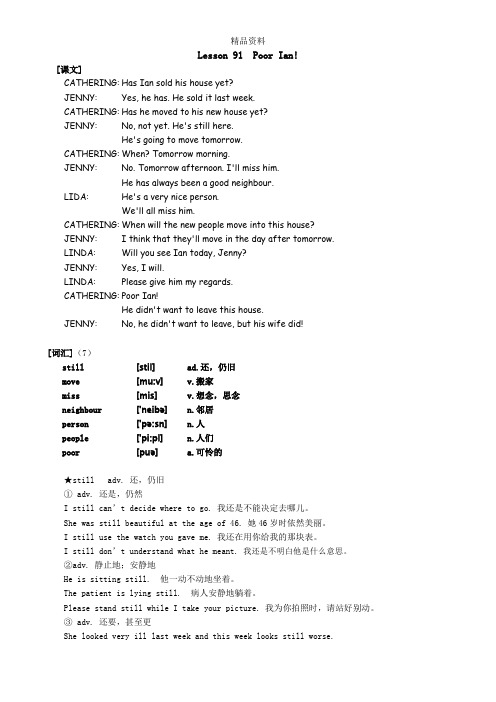lesson92一般将来时
新概念英语第一册91-92课笔记

新概念英语第一册91-92课笔记-CAL-FENGHAI.-(YICAI)-Company One1Lesson 91 Poor Ian![课文]CATHERING: Has Ian sold his house yet?JENNY: Yes, he has. He sold it last week.CATHERING: Has he moved to his new house yet?JENNY: No, not yet. He's still here.He's going to move tomorrow.CATHERING: WhenTomorrow morning.JENNY: No. Tomorrow afternoon. I'll miss him.He has always been a good neighbour.LIDA: He's a very nice person.We'll all miss him.CATHERING: When will the new people move into this house?JENNY: I think that they'll move in the day after tomorrow.LINDA: Will you see Ian today, Jenny?JENNY: Yes, I will.LINDA: Please give him my regards.CATHERING: Poor Ian!He didn't want to leave this house.JENNY: No, he didn't want to leave, but his wife didstill [stil] ad.还,仍旧move [mu:v] v.搬家miss [mis] v.想念,思念neighbour ['neibə] n.邻居person ['pə:sn] n.人people ['pi:pl] n.人们poor [puə] a.可怜的★still adv. 还,仍旧① adv. 还是,仍然I still can’t decide where to go. 我还是不能决定去哪儿。
新概念1第92课

5.She drove to London yesterday. _________________________________ 6.She telephoned him yesterday. _________________________________ 7.He had a shave yesterday. _________________________________ 8.She swept the floor yesterday. _________________________________
2.She will come this evening.
__________________________________
3.It will snow tonight.
__________________________________
4.He will not believe me.
__________________________________
课堂练习
(复习L91-L92)
Ⅳ Rewrite the sentences according to the requests. (改写下列句子) 1. Lucy and I have had lunch. (改为否定句) ___________________________________________________ 2. They have seen the film. (改为一般疑问句,并做出否定回答) __________________________________________________ 3. Jack has gone to England. (改为否定句) ___________________________________________________ 4. Have you read this book yet? (改为肯定句) ___________________________________________________
新概念一 lesson91-92 (完整版)

New words and expressions
• poor [ puE ]
adj.
3)笨拙的,差劲的
poor jokes 差劲的笑话
a poor excuse 笨拙的借口
New words and expressions
• poor [ puE ]
adj.
3)笨拙的,差劲的 sth
be poor at 不擅长….. doing sth eg: My daughter is poor at swimming.
( D)7.Mr smith _______________to Tokyo and he will be back in
a week • A. has been B. has visited C. has sent D. has gone
( B)8.They___________________ China for two years
Lesson 91 -- 92
Poor Ian ! When will …. ?
new words
• 1 believe [bi'li:v] v.相信,认为 • 7 because [bi'kɔz] conj.因为
• 2 may [mei] (用于请求许可)可以 • 8 retire [ri'taiə] v.退休
new words
New words
still [ stil ]
person [ `pE:sEn ]
adv.还,仍旧 move [mu:v ]
v.搬家 miss [ mis ]
n.人 people [ `pi:pEl]
n.人们
v.想念,思念
poor [ puE ]
新概念英语第一册91-92课笔记.doc

Lesson 91 Poor Ian![课文]CATHERING: Has Ian sold his house yet?JENNY: Yes, he has. He sold it last week.CATHERING: Has he moved to his new house yet?JENNY: No, not yet. He's still here.He's going to move tomorrow.CATHERING: When? Tomorrow morning.JENNY: No. Tomorrow afternoon. I'll miss him.He has always been a good neighbour.LIDA: He's a very nice person.We'll all miss him.CATHERING: When will the new people move into this house?JENNY: I think that they'll move in the day after tomorrow.LINDA: Will you see Ian today, Jenny?JENNY: Yes, I will.LINDA: Please give him my regards.CATHERING: Poor Ian!He didn't want to leave this house.JENNY: No, he didn't want to leave, but his wife didstill [stil]ad.还,仍旧move [mu:v]v.搬家miss [mis]v.想念,思念neighbour ['neibə] n.邻居person ['pə:sn] n.人people ['pi:pl] n.人们poor [puə] a.可怜的★still adv. 还,仍旧① adv. 还是,仍然I still can’t decide where to go. 我还是不能决定去哪儿。
新概念英语第二册:第92课课文详解及语法解析

【导语】新概念英语⼀共144课。
整本书⽆论是语法还是词汇,题材还是语句,都有其出彩之处。
正是因为如此,新概念英语更是经久不衰,深受⼴⼤英语学习者的喜爱。
为您整理了“新概念英语第⼆册:第92课课⽂详解及语法解析”,希望可以帮助到您! 课⽂详注 Further notes on the text 1.ask for trouble,⾃找⿇烦,⾃讨苦吃(多⽤于⼝语)。
You shouldn't have been so rude to her. You are asking for trouble. 你不该对她那么粗鲁。
你这是⾃找⿇烦。
The boss seems to be annoyed. To talk to him now is to ask for trouble. ⽼板似乎在⽣⽓。
现在找他谈话是⾃讨苦吃。
2.I don't think the windows need cleaning at this time of the night. 我看不必在夜⾥这个时侯擦窗⼦吧。
(1)有些动词如 think, believe,expect,suppose 等后⾯跟表⽰否定意思的宾语从句时,否定词not 往往⽤在主句中,但译成汉语时否定意义应在宾语从句中。
我们⼀般不说 I think Mary won't come this evening,⽽说 I don't think Mary will come this evening。
⼜如: I don't believe he is still in London. 我相信他已不在伦敦。
(2)need cleaning 的含义相当于 need to be cleaned。
need 表⽰“需要”时,后⾯接的动名词有被动的含义(cf.第44课语法): The strap needs mending. 这提包带需要修理。
一般将来时讲解

般将来时讲解一般将来时:一、一般将来时的定义:一般将来时表示将来某一时刻的动作或状态,或将来某一段时间内经常的动作或状态。
常常和表示将来的时间状语连用。
女口:tomorrow (明天),next week (下周);in the future (将来)等。
一般将来时由助动词shall (第一人称),will (第二、三人称)动词原形构成。
美式英语则不管什么人称,一律用will。
或用主语+be动词+ going to 动词.二、一般将来时表示方法:1.用will 或shall 表示“助动词will或shall+动词原形”这一形式,表示将来发生的事情,用于征求对方的意见或表示客气的邀请。
在口语中will 用于所有人称,书面语中第一人称常用shall [其实will也可以用到】。
如:①Tomorrow will be Sunday. 明天就是星期天。
②The rain will stop soo n.雨很快就要停了。
③Shall we go there at five?我们五点钟去那儿?4 ④ Will you please ope n the door?请你把门打开?2.用be going to结构表示"be going to+动词原形”用来表示事先考虑过的将要发生的动作以及已有迹象表明必将要发生的某事(有一个先兆),意为“打算;就要”。
如:①We're going to meet outside the school gate 我们打算在校门口见面。
②Look! It's going to rain. 瞧!快下雨了。
3.用现在进行时表示表示位置转移的动词(如:go, come, leave, start, arrive等),可用现在进行时4.表示将来时。
如:①Uncle Wang is coming. 王叔叔就要来了。
②They're leaving for Beijing.他们即将前往北京。
新概念英语第1册第91-92课重点语法和词汇讲解

新概念英语第1册第91-92课重点语法和词汇讲解新概念英语第1册第91-92课重点语法和词汇讲解导语:有时候搬家不是因为想离开,而是不得不离开,下面是一篇关于这方面的英语课文,欢迎大家阅读。
Lesson 91 Poor Ian!可怜的伊恩!Listen to the tape then answer this question.Who wanted to sell the house?听录音,然后回答问题。
谁想卖房?Mrs Smith: Has Ian sold his house yet?凯瑟琳:伊恩已指他的房子卖掉了吗?Mrs Brown: Yes, he has. He sold it last week.詹尼:是的,卖掉了。
他上星期卖掉的。
Mrs Smith: Has he moved to his new house yet?凯瑟琳:他已经迁进新居了吗?Mrs Brown: No, not yet. He’s still here. He’s going to move tomorrow.詹尼:不,还没有。
他仍在这里。
他打算明天搬家。
Mrs Smith: When? Tomorrow morning?凯瑟琳:什么时候?明天上午吗?Mrs Brown: No. Tomorrow afternoon. I’ll miss him. He has always been a good neighbour.詹尼:不,明天下午。
我会想念他的。
他一直是个好邻居。
Mrs Green: He’s a very nice person. We shall all miss him.琳达:他是个非常好的人,我们大学都会想念他的。
Mrs Smith; When will the new people move into this house?凯瑟琳:新住户什么时候搬进这所房子?Mrs Brown: I think that they will move in the day after tomorrow.詹尼:我想他们将会在后天搬进来吧。
新概念第一册Lesson 91-92知识点及拓展

Lesson 91-92Poor Ian!CATHERING: Has Ian sold his house yet?JENNY: Yes, he has. He sold it last week.CATHERING: Has he moved to his new house yet?JENNY: No, not yet. He's still here. He's going to movetomorrow.CATHERING: When? Tomorrow morning?JENNY: No. Tomorrow afternoon. I'll miss him.He has always been a good neighbour.LIDA: He's a very nice person. We'll all miss him. CATHERING: When will the new people move into thishouse?JENNY: I think that they'll move in the day aftertomorrow.LINDA: Will you see Ian today, Jenny?JENNY: Yes, I will.LINDA: Please give him my regards.CATHERING: Poor Ian! He didn't want to leave this house.JENNY: No, he didn't want to leave, but his wife did!1. Has Ian sold his house yet?Has he moved to his new house yet?--yet 己经,还(疑问句,否定句)--already (肯定句)--My father has already come home form work.(already置于助动词与实义动词之间)--Has your father come home yet?(yet一般放在句末)--My father hasn't come home from work yet.2. He sold it last week.一般过去时,强调“上周”这个时间所发生“卖房”的这个动作。
- 1、下载文档前请自行甄别文档内容的完整性,平台不提供额外的编辑、内容补充、找答案等附加服务。
- 2、"仅部分预览"的文档,不可在线预览部分如存在完整性等问题,可反馈申请退款(可完整预览的文档不适用该条件!)。
- 3、如文档侵犯您的权益,请联系客服反馈,我们会尽快为您处理(人工客服工作时间:9:00-18:30)。
根据所给动词/动词短语造句姓名:
rain过去式过去分词现在分词
1.正在下雨。
2.昨天下雨了。
3.已经下雨了。
4.明天将会下雨。
arrive 过去式过去分词
1.他们两天以前到的。
2.他们已经到了。
3.他们后天会到。
have a shave 动词原形动词的过去式动词的过去分词动词现在分词
1.他正在刮脸。
2.他每天都刮脸。
3.他昨天刮脸了。
4.他明天刮脸。
5.他打算五分钟以后刮脸。
sweep the floor 动词原形动词过去式动词过去分词
动词现在分词
1.她经常打扫地板。
2.她正在打扫地板。
3.她刚刚打扫了地板。
4.她昨天打扫了地板。
5.他明天早上将会打扫地板。
repair my car动词原形动词过去式动词过去分词动词现在分词
1.他们正在修理我的车。
2.他们已经修理完我的车了。
3.他们昨天修理的我的车。
4.他们后天会修理我的车。
时态结构及转换姓名:
现在进行时结构:
写一个肯定句:
变成问句:
肯定回答:否定回答:变成否定句:
一般过去时结构:
写一个肯定句:
变成问句:
肯定回答:否定回答:变成否定句:
现在完成时结构:
写一个肯定句:
变成问句:
肯定回答:否定回答:变成否定句:
一般将来时结构:
写一个肯定句:
变成问句:
肯定回答:否定回答:变成否定句:。
